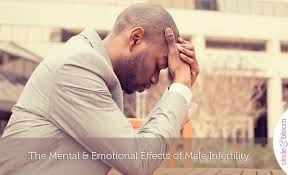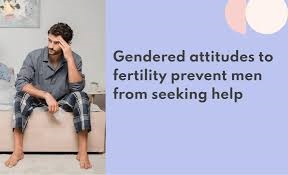Emotional Impact of Male Infertility

Male infertility can have profound emotional consequences that extend beyond the medical diagnosis. The journey toward understanding and addressing infertility often brings a range of feelings, including sadness, anxiety, depression, and isolation. This article delves into the emotional toll of male infertility, its impact on relationships, self-esteem, and body image, and the importance of seeking support.
The Emotional Toll of Infertility

1. Feelings of Sadness and Grief
Men facing infertility often experience deep sadness and grief. The inability to conceive can feel like a loss, as dreams of fatherhood and family may seem out of reach. This grief can manifest in various ways, from general feelings of hopelessness to more profound sadness that affects daily life. Men may mourn not just the potential for children, but also the expectations and societal norms surrounding fatherhood.
2. Anxiety and Stress
The uncertainty associated with infertility can lead to heightened anxiety and stress. Men may worry about the medical processes involved, financial implications, and the future of their relationships. This anxiety can be overwhelming, often leading to obsessive thoughts about fertility treatments and outcomes. The pressure to succeed can create an additional layer of stress, exacerbating emotional distress.
3. Depression
The emotional burden of infertility can sometimes lead to clinical depression. Feelings of inadequacy and frustration can compound over time, making it difficult for men to find joy in life. Symptoms may include persistent sadness, loss of interest in activities, changes in appetite, and difficulty concentrating. In severe cases, men may experience thoughts of self-harm or hopelessness.
4. Isolation and Loneliness
Infertility can lead to profound feelings of isolation. Men may feel they are alone in their struggles, as societal expectations often discourage open discussions about emotional pain. The stigma surrounding infertility can make men reluctant to share their experiences, leading to silence and loneliness. This isolation can be further intensified if friends and family members are unaware of the emotional toll that infertility can take.
Impact on Relationships

1. Strain on Romantic Partnerships
Infertility can place significant strain on romantic relationships. Couples may find themselves facing differing coping mechanisms, where one partner may be more open about their feelings while the other may withdraw. Communication can break down as couples navigate their emotional responses to infertility, leading to misunderstandings and conflicts.
2. Changes in Intimacy
The stress of infertility often affects sexual intimacy. Men may experience performance anxiety or feel pressure to conceive, which can lead to decreased sexual desire. This change can create a cycle of stress and dissatisfaction within the relationship, further complicating emotional connections.
3. Impact on Friendships
Infertility can also affect friendships, as men may distance themselves from social circles. They might feel uncomfortable discussing their struggles or may withdraw from gatherings where children are present. This isolation can lead to a lack of support, making it even more challenging to cope with the emotional impact of infertility.
Self-Esteem and Body Image

1. Erosion of Self-Esteem
The challenges of infertility can lead to a decline in self-esteem. Men may internalize the inability to conceive as a personal failure, questioning their masculinity and worth. Societal norms often equate fatherhood with virility and success, and failing to meet these expectations can lead to feelings of inadequacy.
2. Body Image Concerns
Men experiencing infertility may also struggle with body image issues. Conditions that contribute to infertility, such as hormonal imbalances or medical conditions, can affect physical appearance. The pressure to conform to societal ideals of masculinity can exacerbate feelings of self-doubt, leading to a negative perception of one’s body.
Seeking Support as a male infertility patient

Recognizing the emotional impact of male infertility is crucial for promoting healing and resilience. Seeking support can make a significant difference in coping with these challenges:
1. Professional Counseling
Engaging with a mental health professional can provide a safe space to explore feelings and develop coping strategies. Therapy can help men process their emotions, address relationship challenges, and build resilience.
2. Support Groups
Joining support groups can alleviate feelings of isolation. Connecting with others facing similar struggles allows men to share experiences, find camaraderie, and gain valuable insights into managing infertility.
3. Open Communication
Encouraging open communication within relationships is vital. Couples should discuss their feelings, fears, and expectations regarding infertility. This dialogue can foster understanding and strengthen emotional bonds.
Conclusion.
The emotional impact of male infertility is profound and multifaceted, affecting not only individual mental health but also relationships and self-perception. By acknowledging the emotional toll of infertility and seeking support, men can navigate this challenging journey with resilience and hope. Open dialogue and understanding within relationships and communities can create a more supportive environment for those facing the difficulties of infertility.
References:
- Greil, A. L., McQuillan, J., & Slauson-Blevins, K. (2010). “The Social Context of Infertility.” Social Science & Medicine, 70(8), 1243-1250.
- Domar, A. D., & Rooney, K. (2013). “The Impact of Infertility on Relationships.” American Journal of Obstetrics and Gynecology, 208(3), 207-212.
- Shindel, A. W., & Naughton, C. K. (2009). “The Impact of Male Infertility on Relationships.” International Journal of Urology, 16(10), 870-875.
Written by Fawzi Rufai, Medically Reviewed by Sesan Kareem